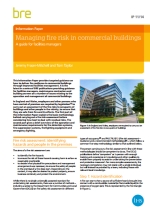Managing fire risk in commercial buildings: A guide for facilities managers
BRE (Building Research Establishment) is an independent, research-based consultancy, testing and training organisation, operating in the built environment and associated industries.
Managing fire risk in commercial buildings: A guide for facilities managers (IP 11/14) was published by BRE on 23 September 2014. It was written by Jeremy Fraser-Mitchell and Tom Taylor. It is one of a number of BRE publications offering guidance for facilities managers, maintenance contractors and building owners about the operation and management of commercial buildings.
In England and Wales, employers and other people who have control of premises must carry out an assessment of the fire risks to occupants of buildings and other people in the vicinity, to ensure that they are safe from fire and its effects. IP 11/14 provides guidance about how improved facilities management can help deliver fire resilience in commercial buildings.
The first part of the 8-page Information Paper explains how to carry out a fire risk assessment and how best to deal with residual risks. The second part gives an overview of operational and maintenance requirements for fire detection systems, fire suppression systems, firefighting equipment and emergency lighting.
The contents of the Information Paper are:
- Fire risk assessment: identifying hazards and people in the premises.
- Fire risk management: coping with residual risks.
- Planning, recording, instruction and training.
- Fire protection equipment and facilities.
- Conclusions.
- References.
[edit] Related articles on Designing Buildings Wik
- Automatic fire detection and alarm systems, an introductory guide to components and systems BR 510.
- Automatic fire sprinkler systems: A good practice guide.
- BRE articles on Designing Buildings Wiki.
- BRE Buzz articles on Designing Buildings Wiki.
- BRE Buzz.
- Building Research Establishment.
- External fire spread, Supplementary guidance to BR 187 incorporating probabilistic and time-based approaches.
- External fire spread: building separation and boundary distances (BR 187).
- Fire performance of external thermal insulation for walls of multistorey buildings, third edition (BR 135).
- Fire risk in high-rise and super high-rise buildings DG 533.
- Fire safety certification from CIOB.
- Fire suppression.
- Managing risks in existing buildings: An overview of UK risk-based legislation for commercial and industrial premises (FB 86).
- Risk assessment under The Regulatory Reform (Fire Safety) Order 2005.
- The Regulatory Reform (Fire Safety) Order 2005.
- The role of codes, standards and approvals in delivering fire safety.
- Understanding the factors affecting flashover of a fire in modern buildings.
- Visual alarm devices - their effectiveness in warning of fire.
Featured articles and news
Statement from the Interim Chief Construction Advisor
Thouria Istephan; Architect and inquiry panel member outlines ongoing work, priorities and next steps.
The 2025 draft NPPF in brief with indicative responses
Local verses National and suitable verses sustainable: Consultation open for just over one week.
Increased vigilance on VAT Domestic Reverse Charge
HMRC bearing down with increasing force on construction consultant says.
Call for greater recognition of professional standards
Chartered bodies representing more than 1.5 million individuals have written to the UK Government.
Cutting carbon, cost and risk in estate management
Lessons from Cardiff Met’s “Halve the Half” initiative.
Inspiring the next generation to fulfil an electrified future
Technical Manager at ECA on the importance of engagement between industry and education.
Repairing historic stone and slate roofs
The need for a code of practice and technical advice note.
Environmental compliance; a checklist for 2026
Legislative changes, policy shifts, phased rollouts, and compliance updates to be aware of.
UKCW London to tackle sector’s most pressing issues
AI and skills development, ecology and the environment, policy and planning and more.
Managing building safety risks
Across an existing residential portfolio; a client's perspective.
ECA support for Gate Safe’s Safe School Gates Campaign.
Core construction skills explained
Preparing for a career in construction.
Retrofitting for resilience with the Leicester Resilience Hub
Community-serving facilities, enhanced as support and essential services for climate-related disruptions.
Some of the articles relating to water, here to browse. Any missing?
Recognisable Gothic characters, designed to dramatically spout water away from buildings.
A case study and a warning to would-be developers
Creating four dwellings... after half a century of doing this job, why, oh why, is it so difficult?
Reform of the fire engineering profession
Fire Engineers Advisory Panel: Authoritative Statement, reactions and next steps.
Restoration and renewal of the Palace of Westminster
A complex project of cultural significance from full decant to EMI, opportunities and a potential a way forward.
Apprenticeships and the responsibility we share
Perspectives from the CIOB President as National Apprentice Week comes to a close.


























